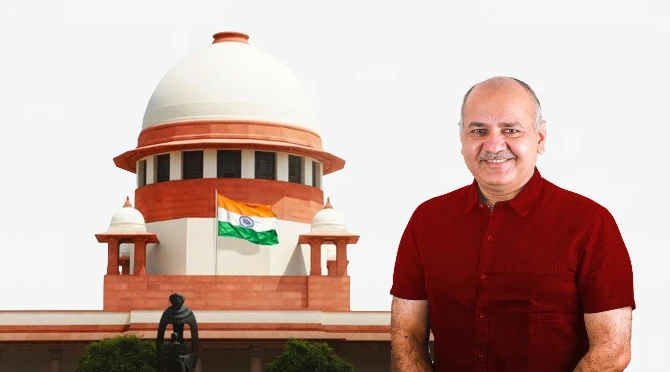
The Supreme Court on Friday granted bail to AAP leader Manish Sisodia, who has been in jail for 17 months, sharply criticizing the lower courts and stating that his prolonged incarceration without trial had deprived him of the right to speedy justice.
A bench of Justices B R Gavai and K V Viswanathan, in a scathing verdict, emphasized that it is high time trial courts and high courts recognize the principle that “bail is the rule and jail is the exception.”
“As observed time and again, prolonged incarceration before being pronounced guilty of an offence should not be permitted to become punishment without trial,” the bench said, describing Sisodia as a man with “deep roots in society.”
The former Delhi deputy chief minister was arrested by both the Central Bureau of Investigation (CBI) and the Enforcement Directorate (ED) in corruption and money laundering cases linked to the alleged Delhi excise policy scam.
With the apex court granting him bail in both cases, Sisodia is likely to be released from jail today after furnishing a bail bond of Rs 10 lakh along with two sureties of a like amount.
Listing the conditions for his bail, the judges said he will have to surrender his passport to the special trial court and not attempt to influence witnesses or tamper with evidence. Additionally, he will have to report to the investigating officer every Monday and Thursday between 10-11 am.
“We find that, on account of a long period of incarceration running for around 17 months and the trial even not having been commenced, the appellant (Sisodia) has been deprived of his right to a speedy trial,” the bench said.
“As observed by this court, the right to a speedy trial and the right to liberty are sacrosanct rights. On the denial of these rights, the trial court as well as the high court ought to have given due weightage to this factor,” it said.
The court noted that trial courts and high courts have forgotten the well-settled principle of law that bail is not to be withheld as a punishment, referring to earlier judgments.
“From our experience, we can say that it appears that the trial courts and the high courts attempt to play safe in matters of grant of bail. The principle that bail is a rule and refusal is an exception is, at times, followed in breach,” it said.
The bench stated that due to the non-grant of bail even in straightforward cases, the apex court is inundated with a huge number of bail petitions, adding to the massive pendency.
Keeping Sisodia behind bars for an unlimited period of time in the hope of speedy completion of trial would deprive him of his fundamental right to liberty under Article 21 of the Constitution, the judges said.
“In the present case, the appellant (Sisodia) has deep roots in society. There is no possibility of him fleeing from the country and not being available for facing the trial. In any case, conditions can be imposed to address the concern of the state,” it said.
The bench set aside the May 21 verdict of the Delhi High Court which had dismissed Sisodia’s pleas seeking bail in both these cases.
Sisodia had sought bail contending that he has been in custody for 17 months and the trial against him has not yet started. The ED and the CBI had opposed his bail pleas. He was nabbed by the CBI on February 26, 2023, for purported irregularities in the formulation and implementation of the now-scrapped Delhi excise policy 2021-22.
The following month, the ED arrested him in the money laundering case stemming from the CBI FIR on March 9, 2023. He resigned from the Delhi cabinet on February 28, 2023.




